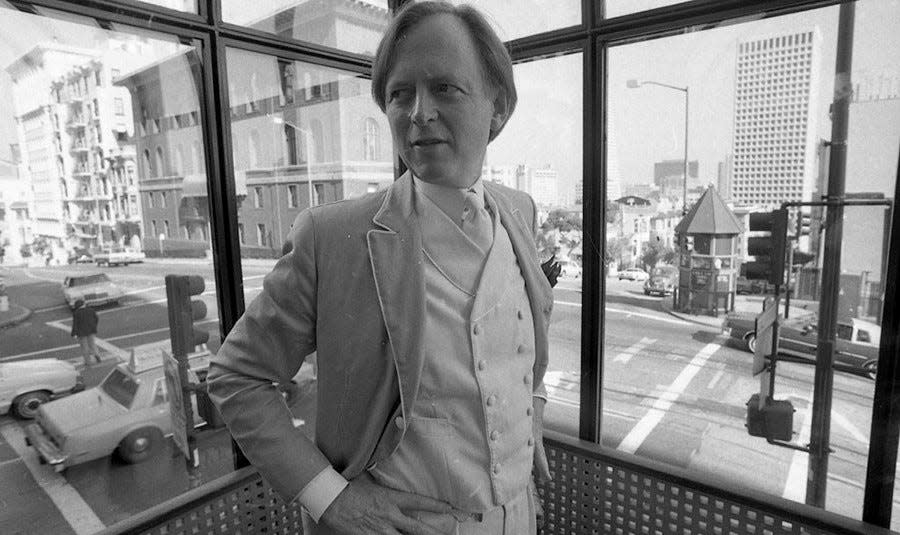'Radical Wolfe' captures culture of America's best-dressed Tom | Movie Review
- Oops!Something went wrong.Please try again later.
Three-piece cream-white suit with matching navy pouchet and necktie, white oxfords down below; three-piece checkered suit, knit tie, walking cane with silver pommel; double-breasted periwinkle suit with white buttons, yellow tie, classic collar pinned by gold tie bar; double-breasted cream-white suit with peak lapels and pocket watch, baby-blue socks match baby-blue dress shirt, white necktie with blue polka dots, white horn-rimmed glasses up above.
In every instance, his hair is always brushed to a satiny sheen. And not a single Windsor knot amid this masterful menswear barrage from the opening minutes of director Richard Dewey’s latest documentary, “Radical Wolfe,” on the life and work of the incomparable Tom Wolfe.

Transforming wisdom into musical adage is something common to great writers. Wolfe is an adept. Consider catchy labels like the “politics of pleasure,” describing 1960s countercultures, or the “carnival of prosperity” for 1980s Wall Street (as depicted in his 1987 debut novel "The Bonfire of the Vanities"). Such tags seem to so efficiently describe a key essence of these uncontainable social spheres. It’s no wonder William F. Buckley called Wolfe, “the most skilled writer in America.”
Beyond a gift for good coinage, Wolfe’s approach to journalism, dubbed “New Journalism,” attempts “the use of every effective technique known to prose in non-fiction.” The effect not only made journalism more literary, inspiring others like Hunter S. Thompson, Joan Didion, and Gay Talese (who’s interviewed in the film), but established Wolfe as one of America’s preeminent and most controversial cultural critics.
His fresh takes on American culture garnered a wide fan base, assessing a variety of milieu from stock car racers to LSD advocates like Ken Kesey (chronicled in 1968’s "The Electric Kool-Aid Acid Test"). But Wolfe also skewered the corruption of politicians and the hypocrisy of the intelligentsia alike, such as his infamous “Radical Chic” article from 1970 on a fundraiser dinner he’d snuck into at Leonard Bernstein’s.
The powerful enemies that Wolfe made, not just in Bernstein and the Black Panthers but in fellow authors as well (John Irving in particular), are well documented by the film, as is Wolfe’s lack of regret. Prior to anything else he was, Wolfe is shown as a writer to the core, claiming that the social effects of anything he writes are always subservient to truth: if the writer is concerned with anything but truth, they become not a writer but a “public relations” expert, he says.
His modus sounds like it could be taken up by conservatives today, making Wolfe a potential “anti-woke” figure. The conflicts between him and thinkers on the Left like JFK and Noam Chomsky would seem to support his potential as a posthumous leader of conservativism, but the feeling I was left with at the end of this documentary was rather politically neutral.
Regardless of his lifelong “vendetta against the intellectual Left” (Tom Junod’s words), Wolfe’s work at heart aims to critique pretentiousness and unexamined assumptions, to evaluate American cultures, to push the boundaries of journalism, and to promote journalistic innovations in the novel, all of which seems applicable across the entire political spectrum.
Technically, Dewey’s film is admirable: well-paced with strong music, and Jon Hamm’s readings of Wolfe carry a transporting vividness. Textural juxtapositions of modern hi-def versus vintage footage makes the viewing a mosaic of alternating nostalgias as the story jumps around. Most importantly, Dewey conveys Wolfe’s complex character with nuance and warmth.
Regardless of his horde of foes, the most common way Wolfe gets described in the film is as a “gentleman.” This dance between his vicious pen and meek manners culminates in an idiosyncratic and irresistibly likeable guy that shines through, even if you like to hate him.
Imagine being a fashion icon as well as one of America’s most successful writers. Now imagine putting on a three-piece suit just to walk into your home office and sit down at your desk. That’s “Tom Wolfe,” with one finger always on the pulse of the times.
If you go
What: “Radical Wolfe” presented by the Tallahassee Film Society
When: 5 p.m. Sunday, Oct. 29, and 7 p.m. on Friday, Nov. 3
Where: All Saints Cinema, 918-½ Railroad Ave.
Cost: $11 general admission, $9 for TFS members and students; visit tallahasseefilms.com
Tommy P. Cowan is a Ph.D. student in the Literature program at Florida State University, and an associate editor at Correspondences: Journal for the Study of Esotericism.
This article originally appeared on Tallahassee Democrat: 'Radical Wolfe' documentary assesses America's best-dressed Tom

